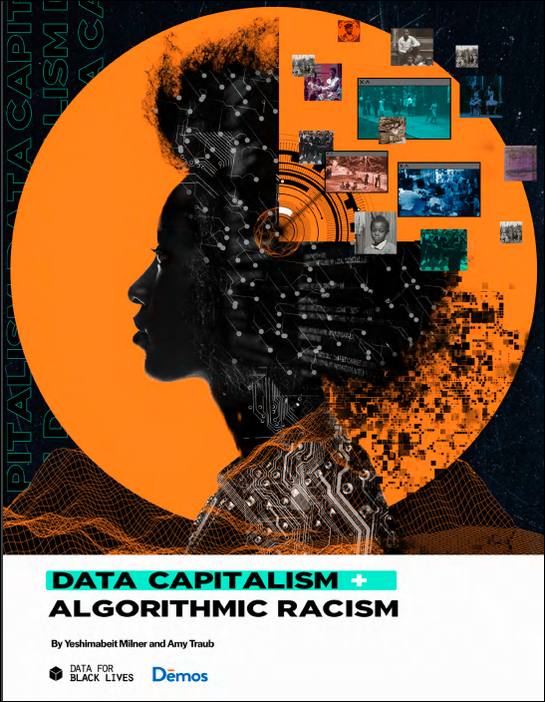
Big Tech companies purposely hoard power that fuels
discrimination, charges a new report from public policy researcher “Demos” and data-science activist organization Data for Black Lives.
The report, “Data Capitalism
+ Algorithmic Racism,” however, provides policy recommendations to solve the problem.
The report defines data capitalism as an economic model rooted in slavery. It relies on
the extraction and commodification of data and the use of Big Data and algorithms to consolidate power and ultimately increase inequality in the U.S. along lines of race, class, gender, and
disability.
“Data capitalism is at the root of American inequality,” asserts Lebaron Sims, associate director of policy and research at research group and think
tank Demos. “It dates back to the origins of our financial system and our economic system...at the foundation of the country.”
advertisement
advertisement
“An accurate accounting of value --
the dollar amount that's assigned to a human life -- undergirded so much of the American economy,” Sims adds, noting: “From the nascent financial or insurance industries to the actual
accumulation of wealth and the development of cities throughout the South, and commerce moving up north.”
These institutional business practices and patterns, originally
created for slavery, are still present in the algorithms and equations used to calculate the value of a human life -- the consumer, or worker -- in today’s market, the report argues.
“We see now with Big Data, with these tech companies that have monetized human behavior, even to the point where they're tracking biometrics –– actual physical human
attributes––that this business is bigger than ever,” said Sims.
Big Tech evolved through hundreds of mergers and acquisitions. Now we have -- as
Wired aptly put it last week in an article about the supposed metaverse, “these few
supermassive players controlling and appropriating the celestial motion of billions of users.” An increasing number of Americans currently support government regulation on Big Tech and feel less
positive about the effects of companies like Meta (previously Facebook), Amazon, and Google, on the country, according to a recent study from the Pew Research Center.
Demos’
report offers many cited examples that not only showcase this general unease, but surround racial targeting, otherwise known as algorithmic racism. This includes Amazon’s facial-recognition
technology that disproportionately misidentified people of color as
wanted criminals; YouTube’s promotion of inflammatory misinformation made to generate clicks; and Facebook allowing advertisers to exclude Black home buyers from viewing real estate ads in
specific neighborhoods.
“Amazon is the perfect encapsulation of racial capitalism,” said Sims. “I think Bezos's world view when he founded Amazon was
that people are naturally lazy, and they need surveillance and coercion and threats not just to perform their work, but so that you can extract every amount of value from them, from their physical
labor.”
This is put into stark relief based on the demographic information of Amazon’s workforce, as the company’s highest-paid jobs are mostly held by white males,
while many lower-paying jobs in Amazon’s warehouses and delivery vehicles are filled by minorities.
Widespread reporting on Amazon’s dehumanizing (the singular
15-minute break; being fired by an app), unfair, and outright dangerous working conditions are put into a more purposefully sinister context when connected to algorithmic racism.
“The algorithms that govern life in these warehouses force people to exert themselves, and use every last bit of themselves, in ways that...aren't designed to be sustainable,”
said Sims in relation to Amazon’s high injury rates among workers.
According to the report, sustainability is only prioritized at Amazon in the hoarding of monopoly
power. In 2019 there was speculation that Amazon’s search algorithm was biased, privileging its own versions of specific goods. The company’s public denial depicted how difficult it is to
uncover the truth behind such a powerful corporation.
The Atlantic dubbed this issue “strategic ignorance,” explaining that algorithms lack transparency
and can therefore “privilege or discriminate without their creators designing them to do so, or even being aware of it.”
Although companies and advertisers regularly deny
discrimination, the report makes the point that data speaks for itself. With so much personal data at their fingertips, companies can easily understand a person’s racial and ethnic identity.
“You don't need to know what race somebody is to know what race somebody is,” says Sims.
In March 2019 Facebook was found guilty of selling “pre-populated
lists” to advertisers who were then able to place housing, employment, and credit ads that could “exclude” African Americans, Hispanics, and Asian Americans. This is the type of
predatory behavior that Demos sees as inevitable without making Big Data transparent, widespread regulation, and the breaking up of Big Tech.
Sims points out that while social
media apps like Facebook are free, consumers are paying for them with their lack of privacy.
“What we need are oversight boards, oversight committees that involve the
public, that make these things more transparent for folks so the public can understand what it is that they're trading in this bargain,” he concludes.